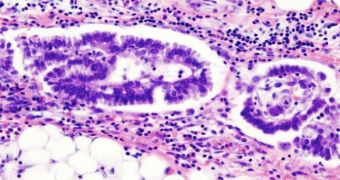In a finding that could very change the way ovarian cancer is treated in as much as 70 percent of all patients, researchers at the US Department of Energy's (DOE) Lawrence Berkeley National Laboratory (Berkeley Lab) were able to decipher the string of genetic mutations that eventually leads to cancer.
Their work was focused on conducting the most comprehensive genetic analysis of any type of cancer to date. They selected a variant of ovarian cancer that affects 7 in 10 women who develop this cancer.
This particular type is very aggressive, and has a high kill rate. As such, finding a way to destroy it could help save thousands of lives every single year. The Berkeley Lab team coordinated the international team that made the discovery.
The research group included hundreds of scientists, who are based at 80+ research institutes and universities around the world. Its main focus was high-grade serous ovarian adenocarcinoma.
Analyzing the genome structure and gene expression patterns in this type of cancer was the first priority. Around 500 patients provided the samples the researchers needed to conduct their work.
The protein-coding part of the genome was also sequenced for 320 of these patients. Together, the two datasets may provide researchers with everything they need to develop new therapies aimed at cancer.
According to the researchers, personalized medicine is the ultimate goal. This means that oncologists want to move away from providing each individual patient with a standard course of treatment. Rather, the experts would prefer to treat each person according to needs.
Details of the study and the methodology it used appear in the June 30 issue of the top journal Nature.
“The Cancer Genome Atlas is about giving a parts list to the cancer community. Clinicians can use the data to propel the next wave of discoveries, such as new cancer therapies and early-detection methods,” explains Paul Spellman.
“We are the first to systematically catalog the genetic mutations associated with ovarian cancer,” adds the expert, the corresponding author of the study, and a professor at the Berkeley Lab Life Sciences Division.
He will also be an associate professor in the Department of Molecular and Medical Genetics at Oregon Health & Science University (OHSU), starting July 1. The expert says that the new work was conducted under the auspices of the Cancer Genome Atlas.
The endeavor is supported by the US National Institutes of Health’s (NIH) National Cancer Institute and National Human Genome Research Institute. Ovarian cancer affects 22,000 women annually in the US, while 14,000 lose their lives as a direct result.

 14 DAY TRIAL //
14 DAY TRIAL //